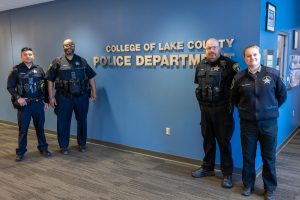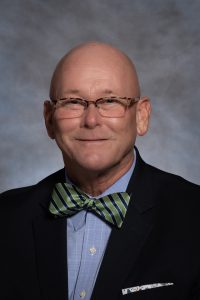CLC teacher’s own experience in overcoming COVID-19
February 4, 2021
Since March 2020, the COVID-19 pandemic has become a health risk for everyone.
The College of Lake County continues to keep classes and in-person extracurriculars shut down for safety measures, intended to reduce the possibility of spreading the virus and endangering others.
CLC’s measures show that, despite the varying and fluctuating levels of lockdown since March, the virus remains as present as ever and continues to affect many people, even students and teachers on campus.
One person who has been directly affected by the virus is Michael Latza, an English teacher at the college and an editor for Willow Review, a creative writing journal on campus.
Latza contracted the virus this past fall.
A short while after dropping his grandson, who he was babysitting, off at home in Wisconsin, he began to show some initial symptoms: a dizzy spell, fatigue, body aches, and some chills.
Thankfully, Latza’s wife is a nurse, so she was able to monitor Latza’s health and blood oxygen, and the two of them prepared for all sorts of outcomes while waiting to see if his symptoms abated or grew worse.

Photo via Michael Latza
Unfortunately, they did grow worse, and Latza was now battling overwhelming exhaustion, low appetite, cold sweats, bone-shaking chills, dry coughs, and a low fever. Latza and his wife had decided to get tested in Waukegan, which Latza recalled to be very organized and efficient.
When the results came back, Latza and his wife had both tested positive, although Latza’s wife remained asymptomatic throughout the entire time–a little more than two weeks, in their particular case.
During those two weeks of illness, the Lake County Department of Health frequently called the couple for check-ups, tracing questions, and information on necessary quarantine procedures.
“[However], because of the lapse between when we were unknowingly infected and when the symptoms started showing up, we ended up infecting several other family members we had contact with. And they think that they infected others.”
This raises the reminder of the importance of social distancing, even if you believe you’re healthy—masks and distancing help yourself and the people around you stay safe.
Latza was able to keep teaching online, however, and he was pretty open about his conditions and symptoms in the hope to alleviate some of the confusion and fears about the virus.
“I put myself up as a cautionary tale—don’t travel, stay isolated, and keep masked in public,” Latza said.
In terms of long-lasting symptoms, the fatigue had persisted past the worst of the virus, and most of the physical activity that Latza enjoyed, like walking and splitting firewood, now brought him to exhaustion.
“I got very tired very quickly, and it was not ordinary tiredness. It was more like sick tiredness, which soon dissipated after some rest. And I was taking more naps than usual,” Latza explained.
Those symptoms have abated now, however, aside from a small tingling sensation in his right hand. Latza remains thankful that his case (and his wife’s) had proved to be relatively mild.

Photo via Michael Latza
“We feel like we were very fortunate to have not been among those who have needed hospitalization due to the virus,” Latza said.
If there’s anything that Latza wants students and teachers at CLC to remember during the pandemic, it is that it’s easy to grow weary and complacent. We should instead be just as vigilant, if not more, and serious about the virus.
“But make no mistake, it is serious business and nothing to make light of. Anyone can die from this virus,” Latza said.
As a parting comment, Latza urges people to wear masks and remain isolated/socially distanced while waiting for the vaccine.






